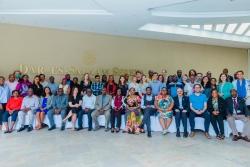
In response to the pressing health challenges facing adolescents in Sub-Saharan Africa (SSA), the NUTRINT project aims to improve adolescent health surveillance and address nutrition-related risks of non-communicable diseases (NCDs). The project spans seven SSA countries, focusing on understanding health behaviours, co-designing interventions, and evaluating their impact and cost-effectiveness.
Key achievements include securing IRB approvals for the study in Dar es Salaam, Tanzania, and advancing surveillance activities through the development of survey questionnaires and tablet-based data entry forms. AAPH plays a central role in co-leading surveillance and data management activities, ensuring robust data collection and storage procedures.
Collaboration with a diverse range of partners from academic institutions and research centres strengthens the project's capacity for research and intervention. Future plans involve in-person meetings to discuss progress and challenges, training of field research assistants, and pilot surveillance activities followed by data cleaning and analysis.
The project's impact lies in its comprehensive approach to addressing adolescent health challenges, including the design and evaluation of the Adolescent Nutrition Fluency Intervention (ANFI) and the assessment of sugar-sweetened beverage taxes. By collecting robust data and informing policy, NUTRINT aims to pave the way for sustainable interventions to improve adolescent health not only within the ARISE partner countries but also beyond, contributing to better health outcomes for adolescents in SSA and globally.
